
(Photos © J. Maus/BikePortland)
It’s sort of strange that Portland’s largest bicycle manufacturer isn’t known for making bicycles. But that’s the case with Chris King Precision Components, a company with 120+ employees that operates a 70,000 square foot factory in Portland’s northwest industrial district.
“The Cielos are made with the same mental focus that goes into our other products… It’s a shared moral fiber that runs through our company culture.”
— Dylan VanWeelden, Chris King Precision Components marketing director
Long known as the world’s most highly-regarded brand of headsets, hubs and bottom brackets. Chris King re-launched Cielo Cycles in 2008. The name means “sky” in Spanish and it comes from a legendary road in King’s hometown of Santa Barbara, California. The road, Camino Cielo (“sky road”) towers 5,000 feet above the city’s famous beaches and is a gateway to many cycling adventures. As a student at University of California at Santa Barbara in the 1990s, I spent countless breathless hours up on Camino Cielo — with the Pacific coastline to one side and the Dick Smith wilderness on the other.
King (the man) made his first frames in 1978, but he put the torch down a few years later when his headsets took the industry by storm. Now, with his business rolling along as smoothly as his coveted hubs, King has fully committed to the Cielo project and the line includes bikes for cyclocross courses, roads (paved and unpaved), and mountains.
What makes the production of Cielos different than many other bicycles is that almost the entire process is done under one roof. From chunks and tubes of raw steel to the finished product, King prefers to keep everything in-house. While most bicycles are made with frame parts like dropouts (the things that the skewers attach to) and fork crowns (the piece that connects the fork legs to the steering tube) purchased from somewhere else and then welded onto the frame’s tubes, the crew at Chris King Precision Components makes these parts themselves. While they purchase tubing and some frame parts from Colombus, Paragon Machine Works and other reputable sources, King makes their own headtube rings, rear brake anchor inserts, seatstay plugs, brake bridge logo beads, fork crowns, fork dropouts, vertical rear dropouts, and semi-horizontal rear dropouts. Then when the frame is done and an order has been placed, they paint it themselves too.
As you might expect from a company whose founder got his start by making surgical tools, they’re all about quality control. And it makes sense: The more steps in the process you control, the higher quality the final product will be.
In the bike industry, there’s a certain aura around Chris King — the company and the man behind it. While Mr. King has become more sociable in recent years, and more open to public and media attention, a certain mystery remains about what goes on in his factory.
It was with that curiosity that I recently spent some time inside 2801 NW Nela Street to get a closer look at how Cielos are made.
My first stop was a CNC (computer numerical control) station where employee Danny Hayford was working on a batch of rear dropouts. Hayford takes a three-inch square piece of steel about one quarter-inch thick, attaches it to the jig inside the CNC machine’s chamber, closes the door, punches in a few lines of code, hits a few buttons on a keypad, turns a few dials, and then the process begins. There are 10 processes each dropout has to go through before it’s ready to be attached to the frame. Hayford said he can make between 20 to 25 dropouts a day.
The factory is an intriguing industrial dreamland — sort of like the bicycle manufacturing version of Willy Wonka’s Chocolate Factory. Machines purr and clap while workers walk about purposefully wearing aprons, eye protection, ear plugs, and heavy duty boots. And the smell of oil is everywhere. With so much steel being cut, oil is poured incessantly through a network of tubes and onto cutting surfaces to keep the parts cool. I asked one employee how much oil he was using and he just grinned and said, “As much as you can get on it.” And, in keeping with his industry-leading environmental ethic, Chris King uses soy-based cutting oil that is recycled, put through a centrifuge, cleaned, then recirculated back into the machines. Through this process, 98% of the cutting oil used is recovered.
At another station, two employees worked on a batch of fork crowns…
From these stations, the parts are taken to other workstations where they’re cleaned, polished, and perfected. “Every step in the process is precisely measured and individually inspected.” says Chris King’s marketing director Dylan VanWeelden, “There’s an eye on each and every part made as it moves through production.”
Eventually these pieces move from the expansive machining area (where parts for all the Chris King products are made) to a special part of the factory devoted only to Cielo Cycles. This is the area where all the pieces come together to create a Cielo. There are hundreds of completed frames hanging from the ceiling and towering shelves full of frame tubes and blue egg crates with finished parts nestled inside them. Unlike a custom framebuilder where one person does everything on one bike at a time, at Cielo, a small team works on batches of six bikes. This allows Cielo to make more bikes and offer a quicker turnaround for customers. Five years into the re-launch, the Cielo crew is making about 300 bikes per year. While you might wait up to a year (or more) for a bike from a custom builder, Cielo promises an order turnaround of 60 days or less.
On the day I was there, Cielo builders Jesse Bambrick, Chris Scuglia, and Buck Olen were focused on various tasks; bending, drilling and filing tubes of all sizes. None of them even looked up as I walked around taking photos. VanWeelden said that might have something to do with the work ethic Chris King has instilled in them. “The Cielos are made with the same mental focus that goes into our other products… It’s a shared moral fiber that runs through our company culture,” he explained.
Once the frames and forks are complete, the bikes are painted to order. The final step before the bikes are shipped to their new owners is a trip to the finishing and frame prep room…
Of course a Cielo isn’t truly “born” until it’s out on the road (or the trail) under the legs of its owner. And, as luck would have it, I finally got a Cielo for myself this summer. The bike has re-kindled my love of riding and it has already taken me all over Oregon on many amazing cycling adventures…
The production of Cielos in Portland means a lot to this city. It shows a tangible example of “bikenomics” at work and it proves to the world that high-quality steel bicycles can be made in the USA at a production level while maintaining responsible environmental standards and labor practices.
We hope you enjoyed this glimpse into the Chris King Precision Components factory. If you want to learn more about Cielo Cycles (which start at $1,895 for frame and fork), check out the website or send an email to getacielo@chrisking.com.



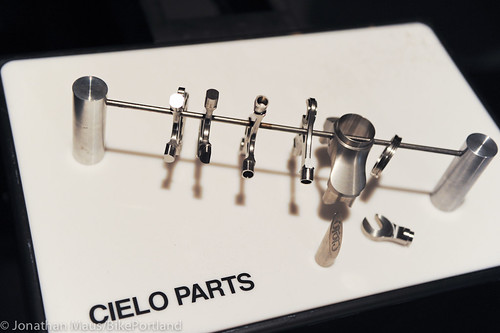
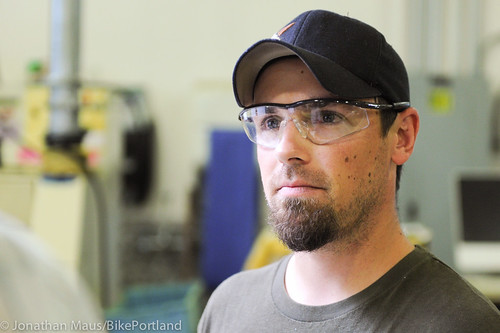
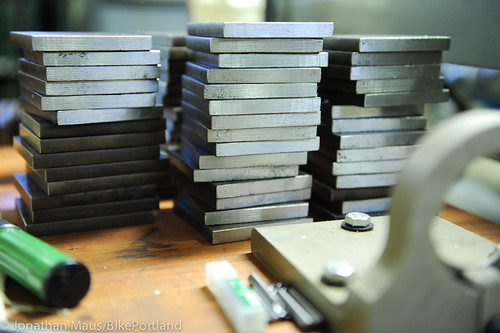
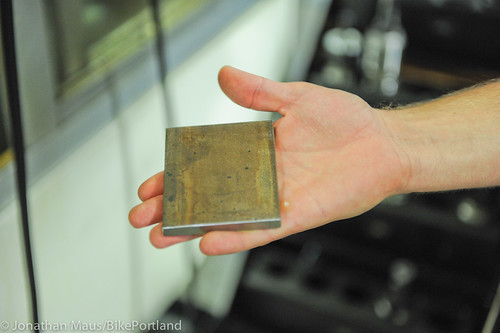
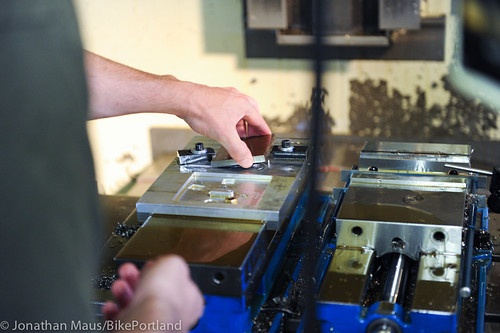
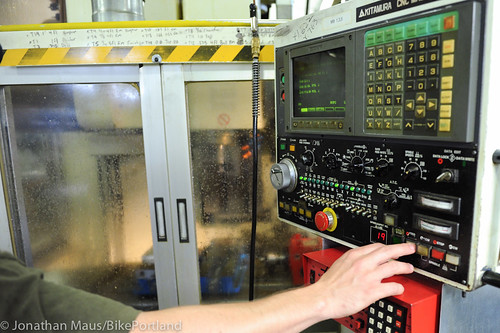
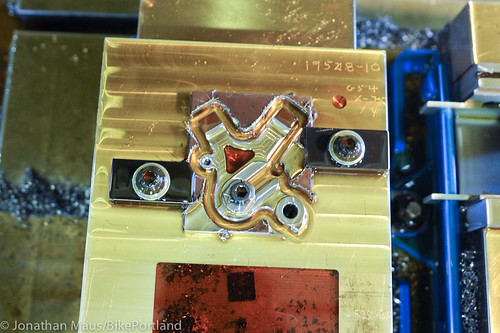
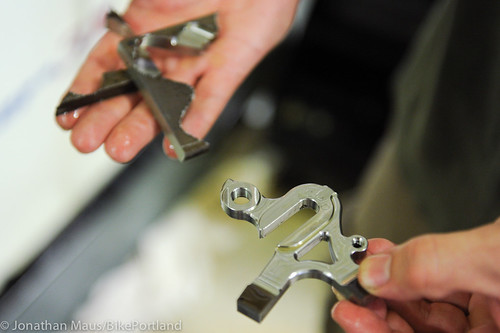
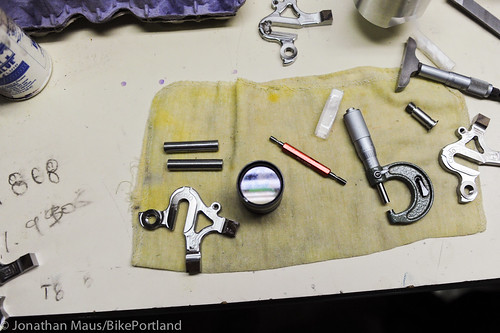
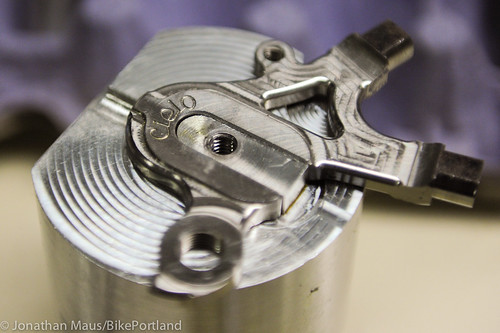
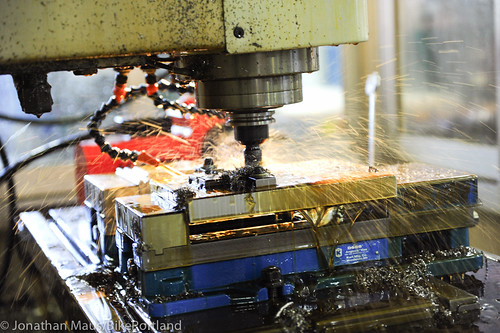
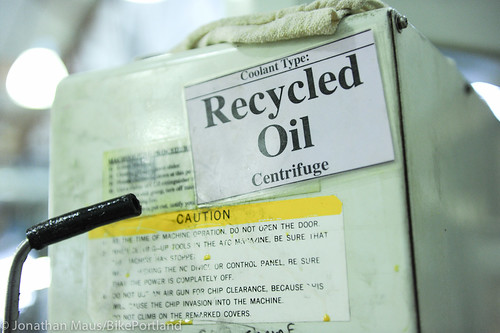
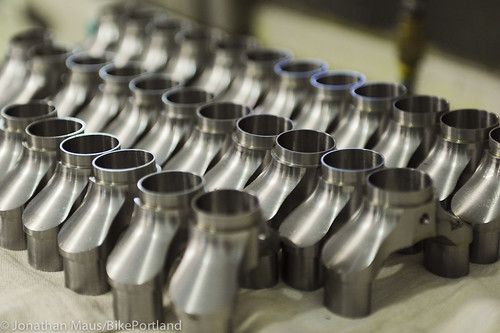
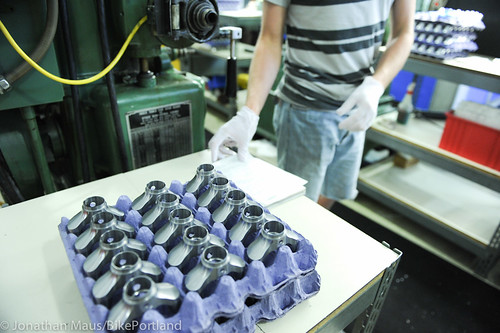
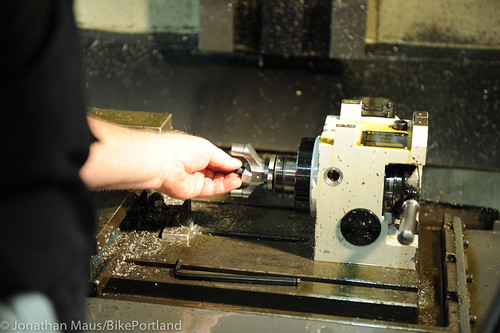
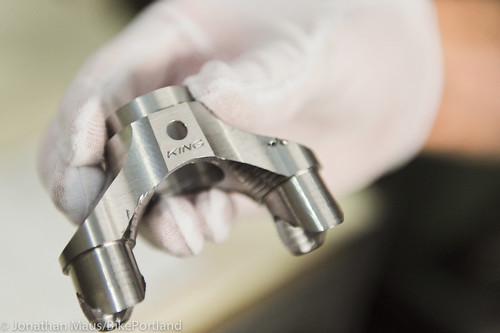
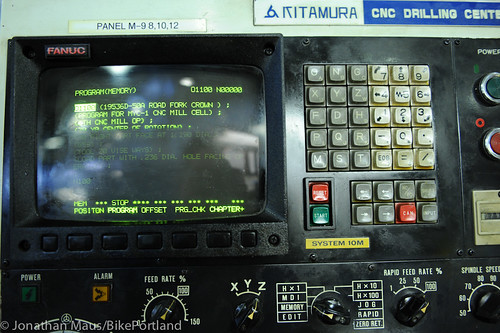
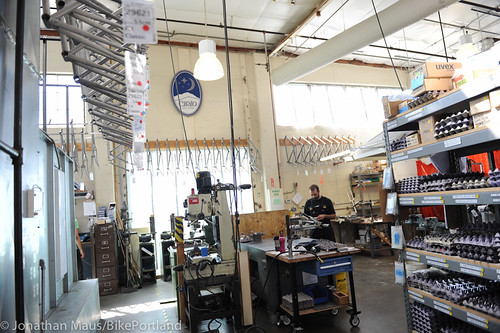
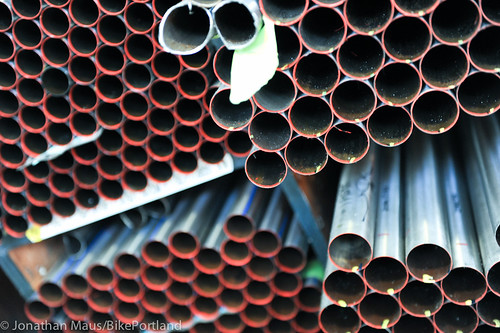
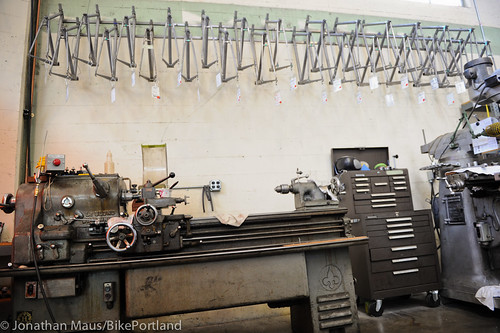
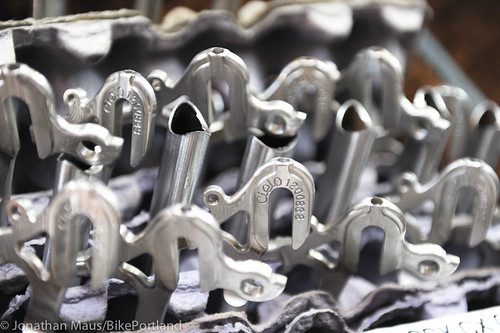
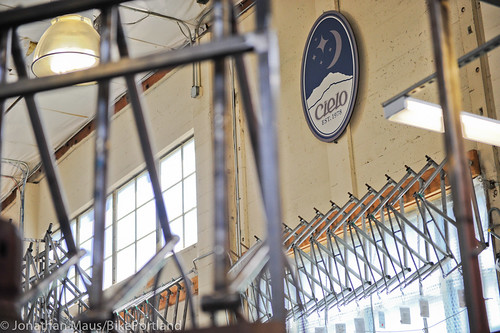
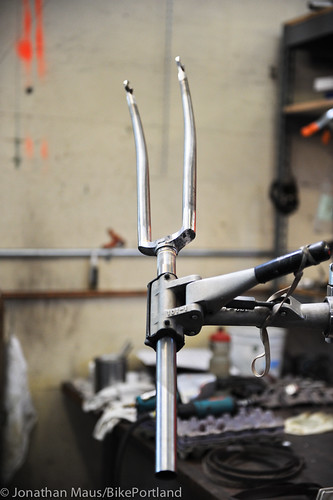
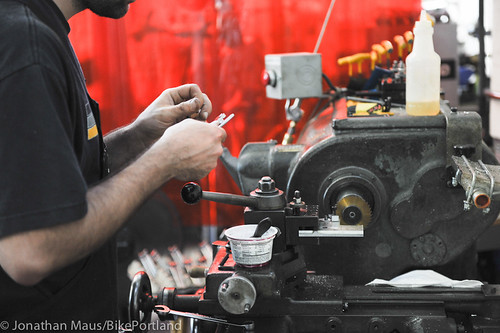
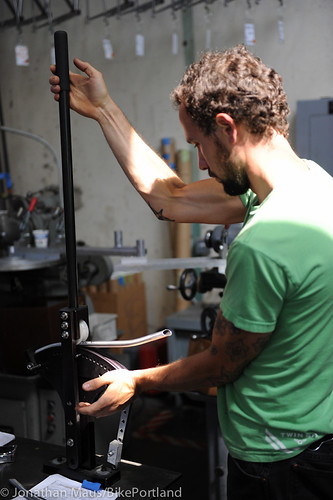
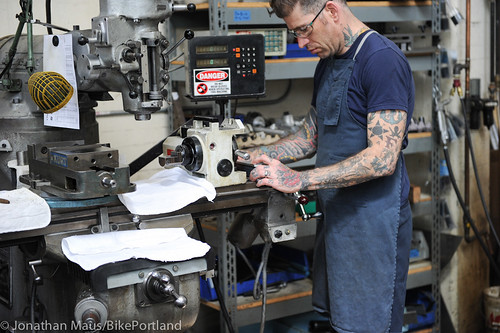
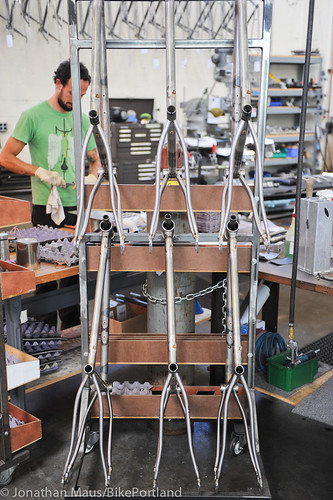
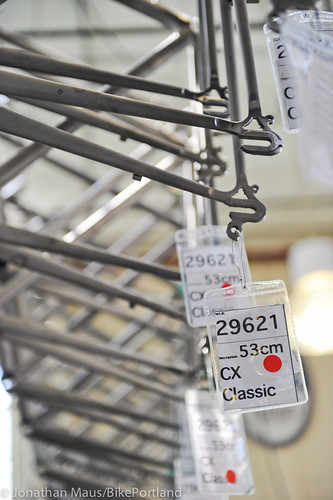
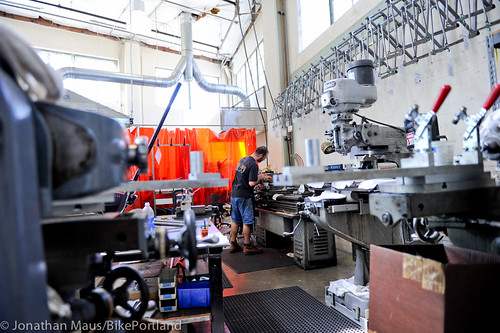
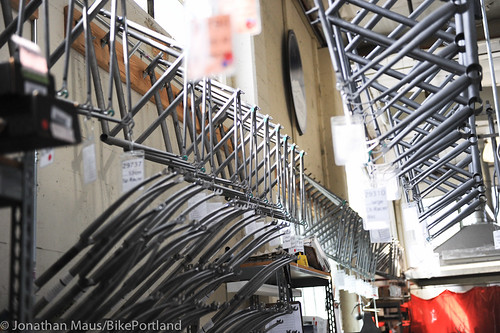
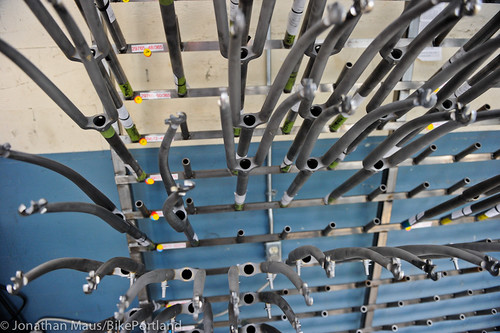
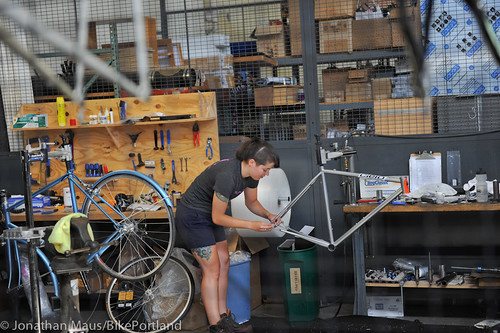
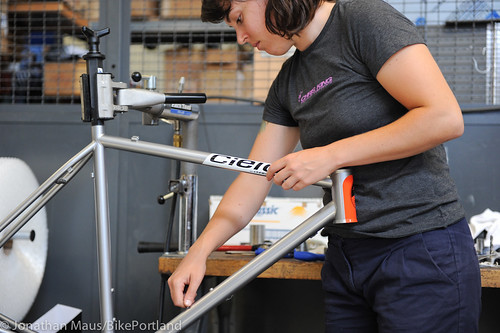
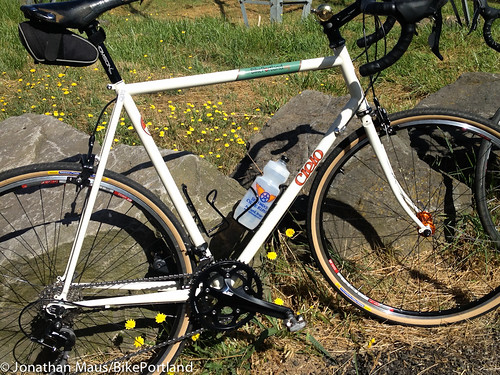


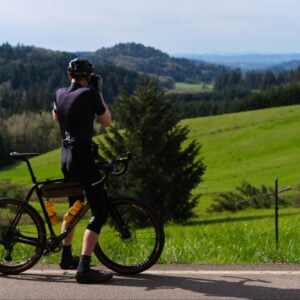

Thanks for reading.
BikePortland has served this community with independent community journalism since 2005. We rely on subscriptions from readers like you to survive. Your financial support is vital in keeping this valuable resource alive and well.
Please subscribe today to strengthen and expand our work.
Great article and pictures!!
ALMOST makes me nostalgic for my days in the Kinesis factory…
Tremendous article! I always hoped that Chris King would give tours of their facility, this article is the next best thing!
Heck yeah. Very inspiring. Someday I’d love to own one of these!
just out of curiosity — what is it specifically about your Cielo that has you re-stoked on cycing so much?
A lot of things… The personal connection to this company and the name of the bike itself is a big one for me. I learned what serious cycling was all about by climbing up to Camino Cielo Road on my old Specialized Stumpjumper (with slick tires) when I was a freshman at UCSB. Then, after I started down the wormhole of serious racing, leg-shaving and all that stuff, I was up there all the time — often above the clouds in silence and beauty. It was a magical place!
The bike itself is also much more relaxed geometry than I previous few bikes, which were racing bikes. Unlike my other road bikes, I have never gotten a sore back or hands or anything after a long ride on my Cielo! The first time I rode it was 80 miles on the Gourmet Century and I was smiling the whole way! It just rides really smooth and strong. I’ve also been using big (relatively) 32c tires which has really been an eye-opener for me in terms of having more fun on my bike. Those large tires, combined with the handling/geometry of the bike have let me ride tons if dirt/rocky roads without any issues. I did 35 miles of logging/gravel roads on the Bullshit 100 ride — flying down hills! — without ever flatting.
And knowing that the bike was made at Chris King (as a former employee I know first-hand how seriously that company takes quality) gives me a lot of confidence in it.
It’s just a fun bike to ride.. And I know that’s part mental, but it’s also partly because of the bike.
More articles like this please! I love to see Portland’s bike industry at work!
Pronounced see-EH-low, correct?
yes. Or you can think of it as… C-L-O.
Cielo (spanish) sky, heaven. Yes, seeEHlow seems accurate to me.
Fascinating article! First time I’ve visited Bike Portland in awhile, but will check in more often to be educated by in depth coverage such as this piece. Your explanation of why you love your Cielo was an added bonus.
I was on the fence about getting a Cielo. Gorgeous, handmade bikes. What swayed me to a Co Motion road bike, handemade in Eugene, is that Co Mo gives a lifetime warranty on their frames vs Cielo’s 5 year warranty. I think if someone is dropping $2k on a frameset they ought to give a lifetime warranty, in my opinion.
Wow, Cielo has some serious explaining to do. In the other article on the home page is a $550 bike made in detroit…with a lifetime warranty! Cielo should step up their game. If Cielo stands behinds their products, has full faith in the science and craft, why not offer a lifetime warranty?
Whether or not a company offers a lifetime warranty has more to do with a company’s specific business strategies than it does the actual product itself.
My first nice bike was an original Cielo, with Dura Ace AX. Did many a climb up San Marcos, over Camino Cielo and down Gibralar on it…
Look, manufacturing jobs! They didn’t all go away.
MAKE AMERICA
Loved the story. I’ve been looking at these for a while. Just not sure whether to go Classic or Racer . . . .
I thought Oscar Camarena was welding for Cielo.